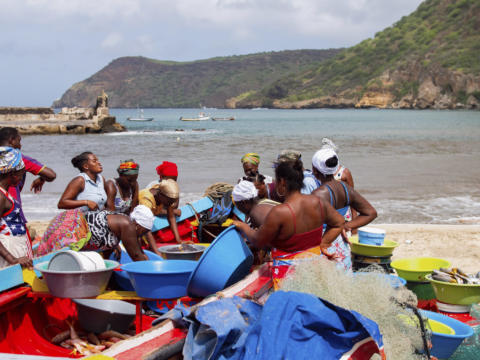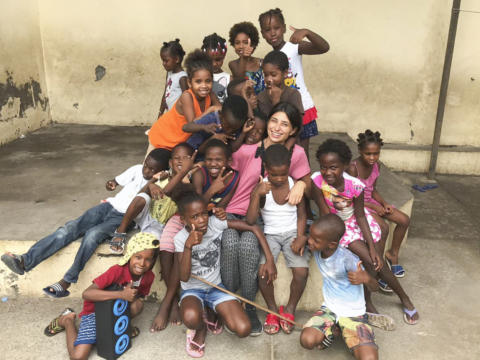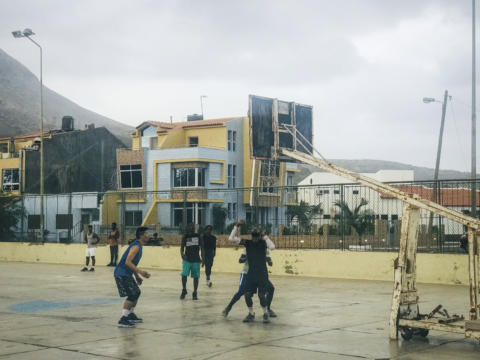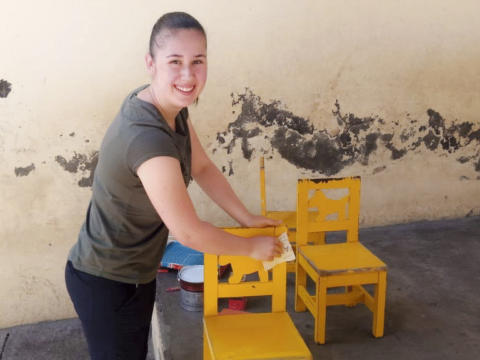Only 420€ per week!
Education Project
Tarrafal - Cape Verde
Education Project
Tarrafal - Cape Verde
Join the education project and enlighten the lives of kids by helping to bring out the best in them!
Our education project is located in Tarrafal which is a small town in the northwest of Cape Verde, along with a Cobalt Blue Sea and lovely beaches. You will be teaching conversational English and other related subjects depending on the necessity of the children in this town, in order to help them do well in their education.
Program Description
With interaction within the participants and the community children, the goal is to prepare children for their future careers with an addition of English proficiency and a global perspective added by participants from all over the world. There are 30 children in kindergarten and 260 students in primary school, with 130 of them being young girls. There are only 5 people involved in addressing the needs of such a vast pool of children in Kindergarten and Primary School.
When considering the social background of this town, the mothers mostly have to raise their children alone and have to work hard. So there isn’t much caretaking and attention to the children’s education. The men are either abroad or work as fishermen or are living in other areas working as labourers. A lot of kids live with neighbours or their grandmothers. A household in Cape Verde has an average of 4 children; rich families have two and poorer families generally have more children. It is not unusual for children to change their place of residence within extended families.
Cape Verde has a history of economic issues, especially droughts that occur from time to time; on the other hand, and also shows a strong social structure in bonds between family members.
Aims & Objectives
Participants would get a unique opportunity to interact with the children in building a global community in the future generations of the stakeholders in addressing various challenges that are global in nature.
Schedule
Monday to Friday
- Kindergarten and Primary School teaching, using English.
- Teaching through activities using board games, playdough and coloring pictures.
- Games and physical education for team building and health.
- Introducing children to colors, shapes and other cognitive exercises.
- A basic introduction to numbers and alphabets in English.
- Games in the playground that enhance exercises and translating the actions in English.
- Introduction to the natural and man-made environment in the naming of trees, water, leaves, grass, metal, water, taps, building etc.
- Short stories, poems and songs that are popular with a majority of the participants.
- Sharing geographical information on their countries that they come from and country locations on the globe.
- Lesson planning and research to plan for the next day’s teaching inputs for the children.
- Maintaining a file on each of the programs that have been covered by you to enable other participants in avoiding repetition and aid handover to new participants.
Note: This schedule can be changed and/or amended depending on weather conditions, local conditions and unforeseen circumstances.
Participant Criteria & Requirements
Standard Requirements
Minimum age: –
Maximum age: –
Minimum English level: Intermediate
CRB required: On Signup
Passport copy required: On Signup
Resume copy required: No
Required qualification: None
Additional Requirements
Yellow fever vaccination is a mandatory requirement for all participants arriving in Cape Verde.
For participants below 18, parental consent is required and for participants above 65, medical clearance is required.
Additional Equipment
Dress Code
- Cover up as much as possible in the spirit of the local culture to avoid embarrassment.
- Your clothes must not be too short, too tight or too revealing. Kindly make sure your shoulders and legs are covered.
- Dress professionally since you will be working in a professional environment while teaching the children.
- It is completely fine to wear western clothes as long as they fit the local standards
- Be thoughtful of the graphics, symbols or text printed on your clothing and avoid wearing clothing styles that might be inappropriate
- Be thoughtful to poor communities by not displaying expensive items and clothes
- Wearing local clothes could help you build a good working relationship with the community
Location
The city is named after the indigenous plant Tarrafe, (Tamarix senegalensis). Also called Mangui or Mangue, it is situated on the northern part of the island of Santiago. A fishing port situated on the northwestern coast and also is a municipality.
About the Accommodation
You can expect to share a room on single gender basis. The bathroom is shared and western toilets are available.
Food Arrangements
The meals will contain a mix of local and various types of Western food.
Facilities
There are ATMs, mini marts, some shops and restaurants available in the city center.
Activities & Events
No scheduled activities outside the program.
Sights & Surroundings
- Tarrafal beach
Transportation
From this location we do not provide free transport to other locations.
Quick Facts
Name: Republic of Cabo Verde
Population: 532,913 (2016)
Capital: Praia
Language: Portuguese, Cape Verdean Creole
Currency: Cape Verdean Escudo (CVE)
Time zone: CVT (UTC-1)
Country Information
The beautiful islands of the Cape Verde were initially uninhabited until it was discovered by the Portuguese in the 15th century. The country flourished during the 16th and the 17th centuries due to the Atlantic slave trade. But with the decline of the slave trade in the 19th century, the country experienced an economic crisis. Yet the location of the island made it survive as it became a significant commercial center in the 19th century as the location was perfect for re-supply of the ships. In the present day context, the economy of the country is mostly relying on the services provided by the country targeting the growing tourism industry.
Climate
Cape Verde has a mild climate compared to the mainland of Africa with an average high temperature of about 26 °C during February and 31 °C in September. The country has an irregular rain pattern in the months between August and October and it is in September that the country experiences its maximum rainfall. The country can boast about the rich vegetation and the forests that provides a rainforest habitat although the close proximity to the Sahara is makes most islands with no mountains mostly dry. The islands as initially were isolated, the existence of a number of endemic species mostly the birds and reptiles can be seen although the existence is threatened by the human developments.
Culture
As the country was discovered by the Portuguese, the culture is immensely influenced by them as the rural Portuguese practices are displayed in the social and cultural patterns of the country. The closeness to the church activities and the football games act as way of interaction between the locals for entertainment.
Transportation
By bus
For travelling within the islands, the most famous transportation is the minibuses which are known as “Yasi” which can accommodate around 12 to 14 passengers. In addition, the modified pickup truck and the cabs which are sometimes covered provide the transport facilities for shorter distances and in rural areas.
By Taxi
Taxis can mostly be found in the cities of Praia and Assomada, and they have unique colored taxis in these two cities, where taxis painted in beige are based in Praia and the taxis painted in white are based in Assomada. The taxis sometimes have a meter fixed to it although they hardly use it as the rates which are usually accepted are cheaper than the ones the metered taxis would count.





